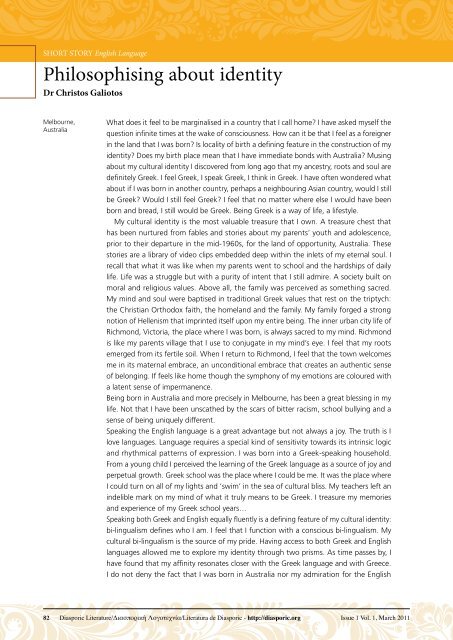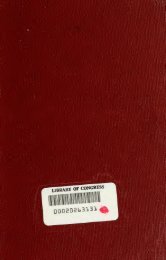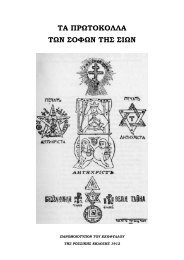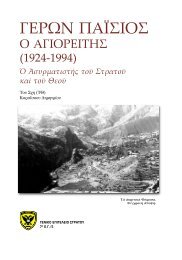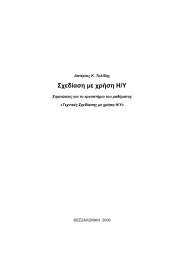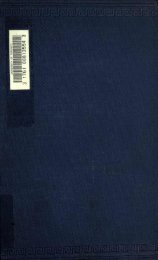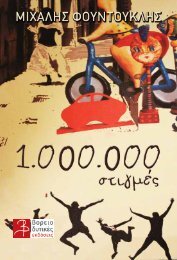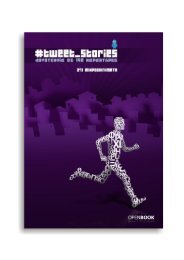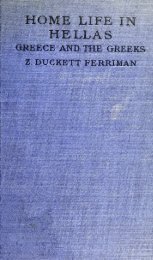DIASPORIC LITERATURE - diasporic.org - eBooks4Greeks.gr
DIASPORIC LITERATURE - diasporic.org - eBooks4Greeks.gr
DIASPORIC LITERATURE - diasporic.org - eBooks4Greeks.gr
You also want an ePaper? Increase the reach of your titles
YUMPU automatically turns print PDFs into web optimized ePapers that Google loves.
SHORT STORY Εnglish LanguagePhilosophising about identityDr Christos GaliotosMelbourne,AustraliaWhat does it feel to be marginalised in a country that I call home? I have asked myself thequestion infinite times at the wake of consciousness. How can it be that I feel as a foreignerin the land that I was born? Is locality of birth a defining feature in the construction of myidentity? Does my birth place mean that I have immediate bonds with Australia? Musingabout my cultural identity I discovered from long ago that my ancestry, roots and soul aredefinitely Greek. I feel Greek, I speak Greek, I think in Greek. I have often wondered whatabout if I was born in another country, perhaps a neighbouring Asian country, would I stillbe Greek? Would I still feel Greek? I feel that no matter where else I would have beenborn and bread, I still would be Greek. Being Greek is a way of life, a lifestyle. My cultural identity is the most valuable treasure that I own. A treasure chest thathas been nurtured from fables and stories about my parents’ youth and adolescence,prior to their departure in the mid-1960s, for the land of opportunity, Australia. Thesestories are a library of video clips embedded deep within the inlets of my eternal soul. Irecall that what it was like when my parents went to school and the hardships of dailylife. Life was a struggle but with a purity of intent that I still admire. A society built onmoral and religious values. Above all, the family was perceived as something sacred.My mind and soul were baptised in traditional Greek values that rest on the triptych:the Christian Orthodox faith, the homeland and the family. My family f<strong>org</strong>ed a strongnotion of Hellenism that imprinted itself upon my entire being. The inner urban city life ofRichmond, Victoria, the place where I was born, is always sacred to my mind. Richmondis like my parents village that I use to conjugate in my mind’s eye. I feel that my rootsemerged from its fertile soil. When I return to Richmond, I feel that the town welcomesme in its maternal embrace, an unconditional embrace that creates an authentic senseof belonging. If feels like home though the symphony of my emotions are coloured witha latent sense of impermanence.Being born in Australia and more precisely in Melbourne, has been a <strong>gr</strong>eat blessing in mylife. Not that I have been unscathed by the scars of bitter racism, school bullying and asense of being uniquely different.Speaking the English language is a <strong>gr</strong>eat advantage but not always a joy. The truth is Ilove languages. Language requires a special kind of sensitivity towards its intrinsic logicand rhythmical patterns of expression. I was born into a Greek-speaking household.From a young child I perceived the learning of the Greek language as a source of joy andperpetual <strong>gr</strong>owth. Greek school was the place where I could be me. It was the place whereI could turn on all of my lights and ‘swim’ in the sea of cultural bliss. My teachers left anindelible mark on my mind of what it truly means to be Greek. I treasure my memoriesand experience of my Greek school years…Speaking both Greek and English equally fluently is a defining feature of my cultural identity:bi-lingualism defines who I am. I feel that I function with a conscious bi-lingualism. Mycultural bi-lingualism is the source of my pride. Having access to both Greek and Englishlanguages allowed me to explore my identity through two prisms. As time passes by, Ihave found that my affinity resonates closer with the Greek language and with Greece.I do not deny the fact that I was born in Australia nor my admiration for the English82 Diasporic Literature/Διασπορική Λογοτεχνία/Literatura de Diasporic - http://<strong>diasporic</strong>.<strong>org</strong>Issue 1 Vol. 1, Μarch 2011


